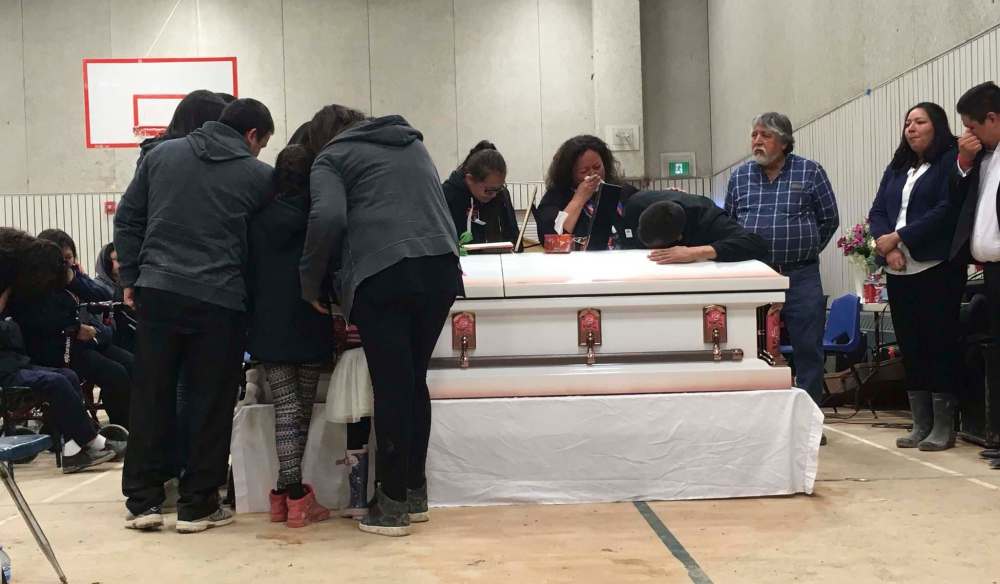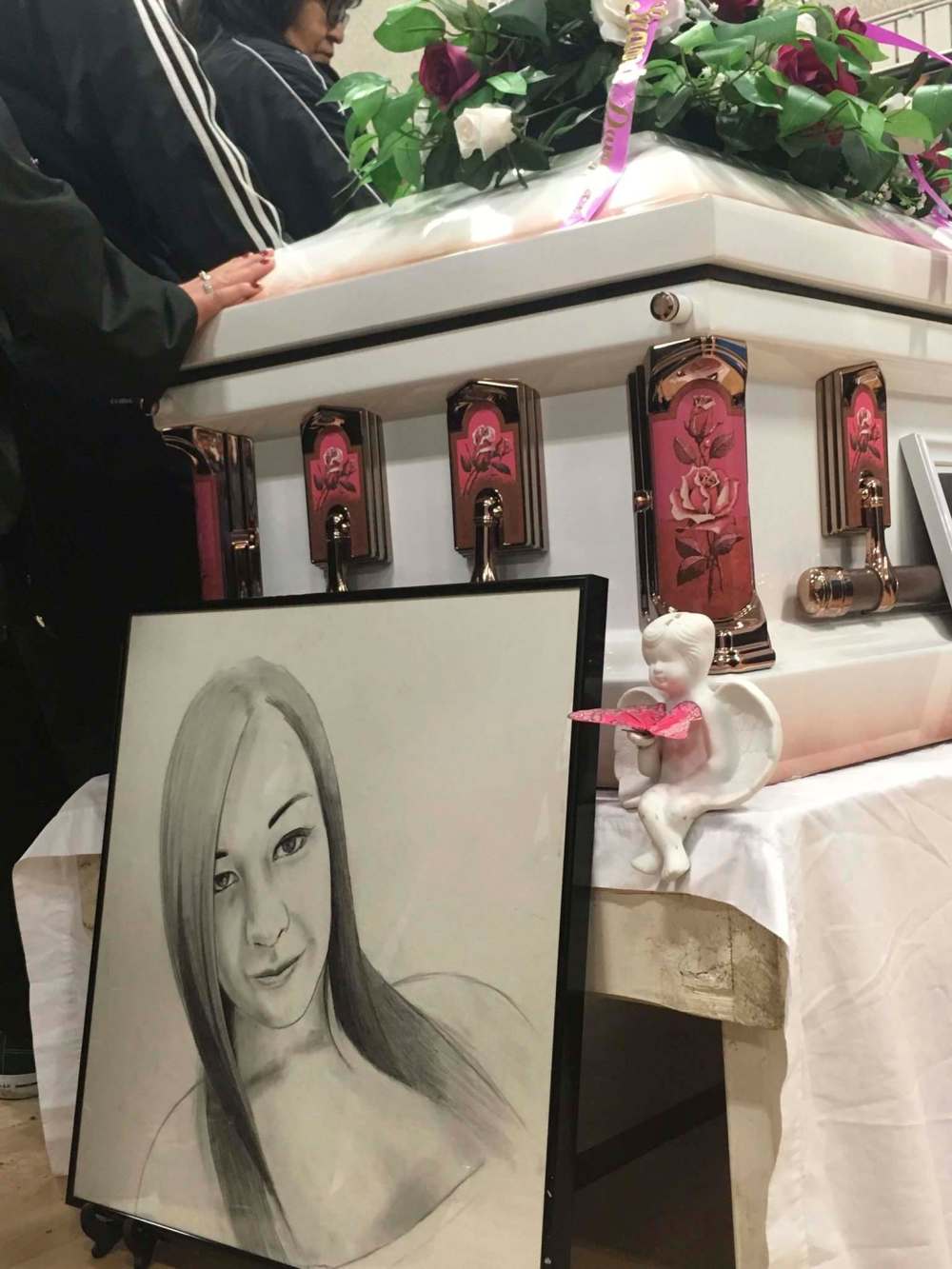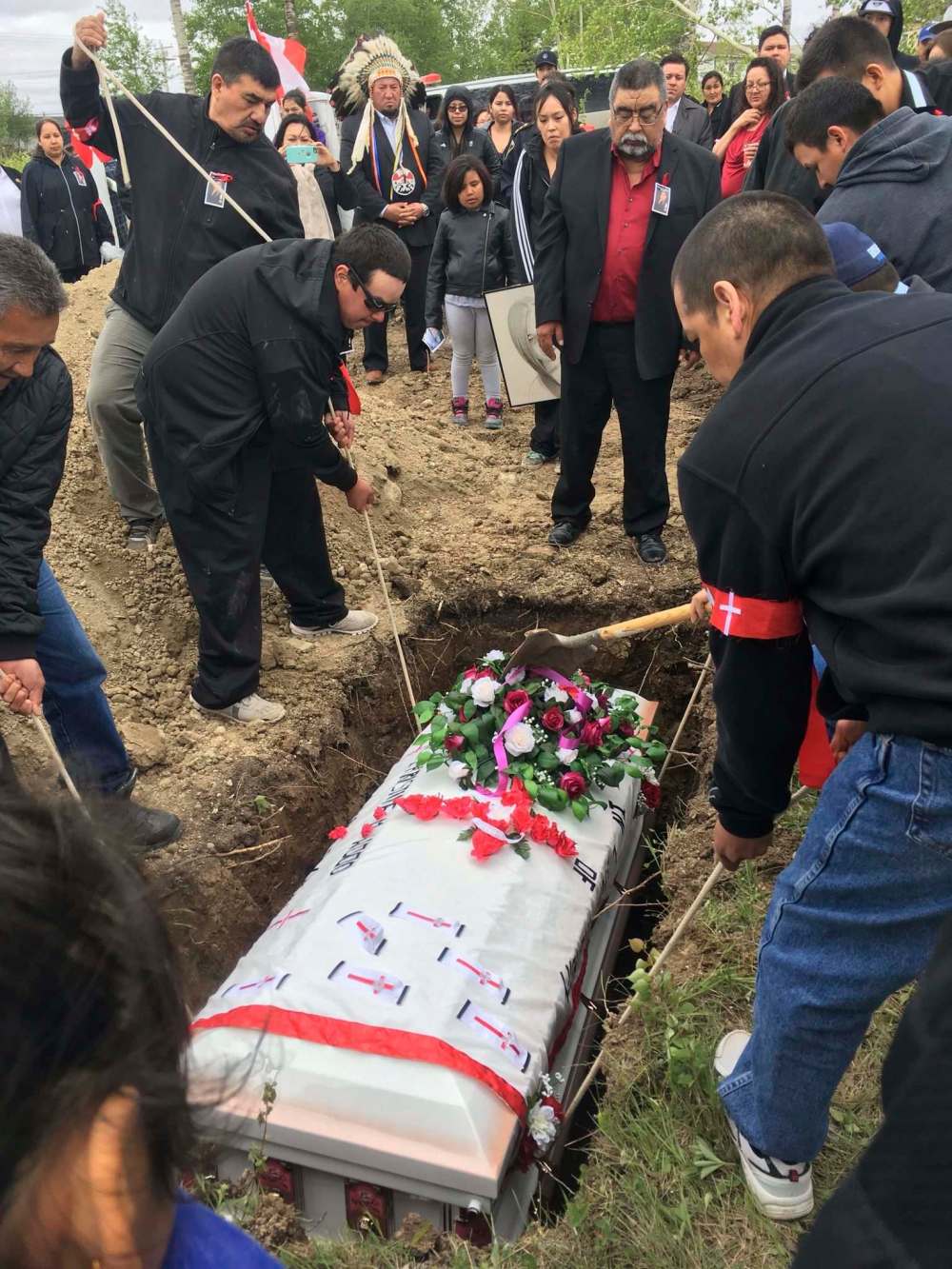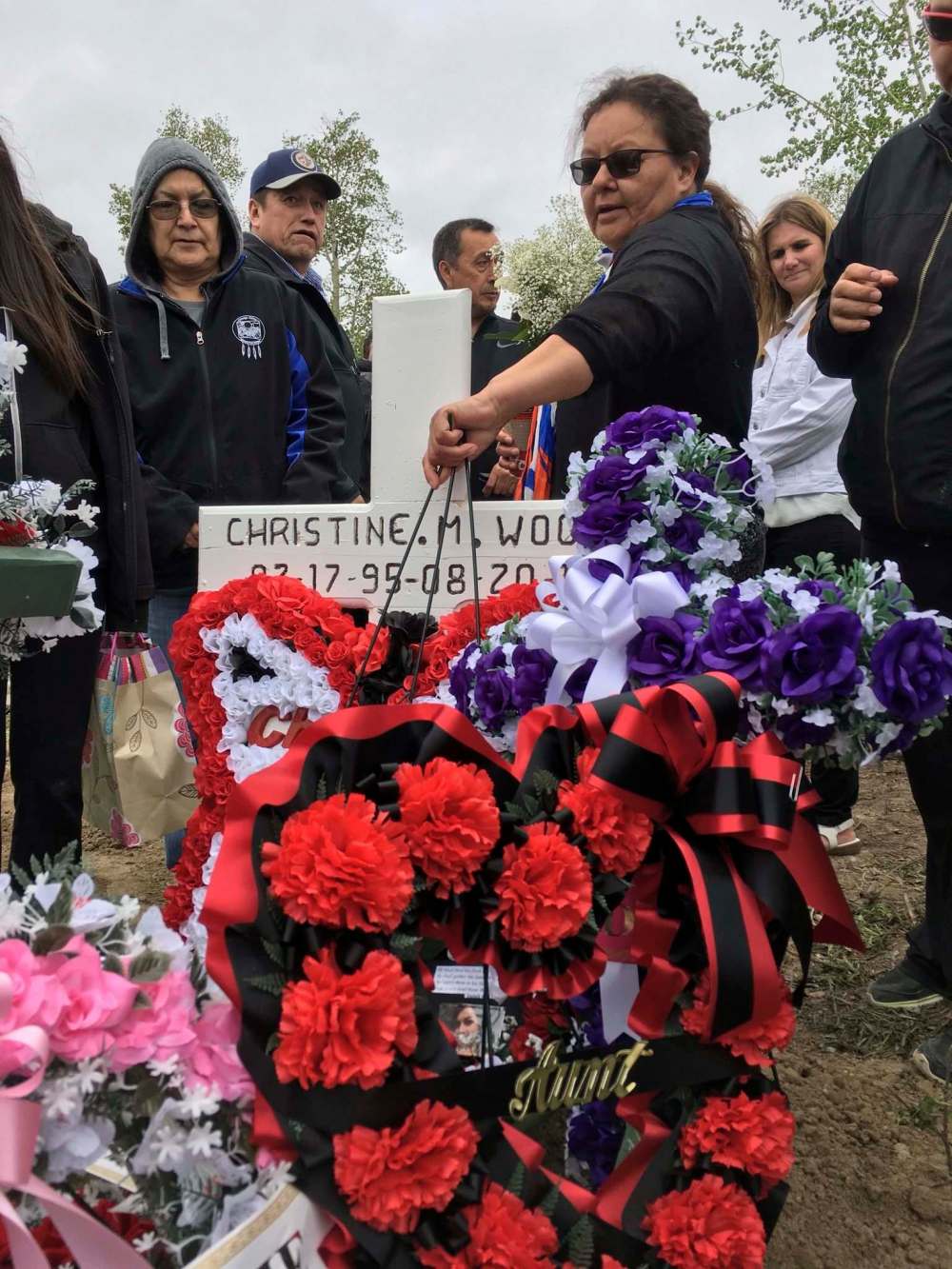Christine Wood laid to rest
Advertisement
Read this article for free:
or
Already have an account? Log in here »
To continue reading, please subscribe:
Monthly Digital Subscription
$0 for the first 4 weeks*
- Enjoy unlimited reading on winnipegfreepress.com
- Read the E-Edition, our digital replica newspaper
- Access News Break, our award-winning app
- Play interactive puzzles
*No charge for 4 weeks then price increases to the regular rate of $19.00 plus GST every four weeks. Offer available to new and qualified returning subscribers only. Cancel any time.
Monthly Digital Subscription
$4.75/week*
- Enjoy unlimited reading on winnipegfreepress.com
- Read the E-Edition, our digital replica newspaper
- Access News Break, our award-winning app
- Play interactive puzzles
*Billed as $19 plus GST every four weeks. Cancel any time.
To continue reading, please subscribe:
Add Free Press access to your Brandon Sun subscription for only an additional
$1 for the first 4 weeks*
*Your next subscription payment will increase by $1.00 and you will be charged $16.99 plus GST for four weeks. After four weeks, your payment will increase to $23.99 plus GST every four weeks.
Read unlimited articles for free today:
or
Already have an account? Log in here »
Hey there, time traveller!
This article was published 11/06/2017 (3107 days ago), so information in it may no longer be current.
OXFORD HOUSE — The tiny turboprop plane dips a wing and, for the first time on its hour-long flight from Winnipeg, drops below cloud. In the seconds before its wheels find the ground, Oxford House spreads out below.
There are the glassy grey lakes that hold the community close. There is the vast green cloak of the forest, freckled by clusters of houses and veined by curving dirt roads. There is the airstrip, that brings crucial cargo and people home.
If you know where to look, you can spot the little cemetery by a hillside. It’s a short drive from the high school where Melinda Wood works. The graves there are hemmed by weathered white fences, and festooned with floral wreaths.

At the heart of the cemetery, a fresh mound of dirt is heaved up from the earth. An open grave waits for Christine.
She is home, now. Ten months after she left for Winnipeg; after she went missing; after people from across Manitoba ached to find her, only to discover that she had been killed and her body hidden, Christine Wood has come home.
Now, on this blustery Saturday, the people of Bunibonibee Cree Nation will lay her to rest. In spring they held a vigil, but after her body was found outside Winnipeg on June 1, the community can at long last have a proper funeral.
“It’s a relief,” Chief Tim Muskego says, solemnly. “We brought our loved one home, and now we can bury her where she should be buried, with family and friends. We are grateful that we found her, and it means a lot to me.”
The turboprop plane touches down, and a handful of passengers stream out. They include Christine’s aunt, uncle and cousins from Winnipeg; they include visiting chiefs from all over, invited here to knit a broader community together.
There is Winnipeg Police Service chief Danny Smyth, making his first trip to an isolated First Nation. Beside him is Sgt. Shaunna Neufeld, who leads the police service’s missing persons unit. Christine’s parents now call her a family friend.
Of all the visiting dignitaries, Sheila North Wilson is the first one off the plane. She too is coming home; today, the former CBC journalist is grand chief of Manitoba Keewatinowi Okimakanak, an assembly of 30 northern First Nations.
But once, she was just a 15-year-old girl from Oxford House, boarding a flight bound for Winnipeg.
Back then, North Wilson remembers, the city seemed full of excitement, full of hope. It was so much bigger than Oxford House, so much busier than the cosy life she’d known. She imagines Christine must have felt that way once, too.
“My impression at the time was everything was going to be beautiful (in Winnipeg), people were going to be kind, people were just beautiful in general,” North Wilson says, with a wistful sigh — she knows it’s more complicated, now.
Before North Wilson left Oxford House that year to continue her schooling, her parents issued a warning. It’s the same one that’s echoed through this community countless times, given by parents worried about the dangers that lurk outside.
“Be careful,” North Wilson’s parents told her. “Be careful who you trust. Always be mindful.”
George and Melinda Wood told their daughter, Christine, the same things, too. More than once.
—

Almost everyone in Oxford House knew Christine, so everyone mourns her. They spill into the elementary school’s gymnasium for the funeral, until all the chairs are taken and latecomers lean against the wall; more than 300 people in all.
Oxford House has known tragedy. In 2016, 26-year-old Cyril Weenusk was murdered near the MTS Centre (now Bell MTS Place) while in Winnipeg for a family member’s medical appointment; in 2015, three people died in a house fire on the reserve.
Yet for many on this remote First Nation, this is the first time they’ve faced a pain quite like this: a young woman gone missing in the big city, followed by months without answers. A horror that creeps across Canada has now hit home.
For many parents here, that tugs at the fears they have for their children. Here, everyone knows not just you, but your parents and aunties and cousins; it’s not like that in Winnipeg. And the city, Chief Muskego thinks, has been changing.
“I used to walk down Main Street (in Winnipeg), and nobody bothered me,” Muskego says. “Now you’re scared to go out after dark. Even my kids, they go to school in the city, and I tell them don’t trust anybody. No matter what it is.”
Muskego pauses. “That’s the advice we give, because we want them to be safe.”
After all, they have big dreams for their children. Four years ago, Oxford House held a feast to celebrate its new high school graduates. It invited Assembly of Manitoba Grand Chief Derek Nepinak to speak, to encourage their young ambitions.
In that crowd, 18-year-old Christine was beaming. She’d been looking forward to the day for a long time; she and her cousin, Howard Grieves Jr., had spent months setting goals for what they wanted to achieve after their graduation.
Grieves thought he might be a teacher or a police officer; Christine wanted to study business, and she would go on to enroll at the University of Winnipeg in 2015. They dreamed of growing up, getting jobs, and traveling the world.
Now, four years later, Grieves is telling that story in a eulogy for his cousin, who he remembers as a “determined, sweet” person. And Nepinak is back, wearing the same headdress as he did to celebrate her graduation.
But there is light, Nepinak says, and he points to the row of dignitaries seated behind him. “It brings me a lot of hope when I see a leader of the Winnipeg Police Service stepping up and getting on a plane with us,” Nepinak says.
The funeral is slow and gentle and beautiful. One of Christine’s cousins sketched her portrait in pencil; it leans against her casket, which is adorned with pink roses. On the casket’s white lid, a Cree-language Bible lies open.

One by one, people step up to sing, or read from biblical scripture. Wearing his police chief uniform, Smyth talks about why he wanted to come for the funeral, and how important it is that victims are not allowed to be faceless.
Then it is time for Christine’s parents to speak, and the gymnasium falls silent, save for the cooing of babies.
George Wood speaks in Cree and English, with Melinda close by his side. He talks about the last 10 months, about the tears, about how they fought to stay strong. He talks about the women that surrounded them, and lifted them up.
He remembers how once, when Christine was a child, she lost control of her bicycle and crashed into a bush. He didn’t laugh then, because he didn’t want to upset his little girl. Now, he laughs a little. The memory is precious.
George wipes tears from his eyes, then offers one more plea for his community, drawing back to the advice he’d told Christine long before. Even when she was out with her friends, they told her to take care of herself, and be careful.
“There are a lot of good people, and I’m sure they outnumber the bad people in Winnipeg,” he says. “But young women and girls, be careful who you trust when you go to the city. Be careful who you trust on social media.”
Then the time for speaking is over. Community members stand up to walk past Christine’s casket, pressing their hands to its cool surface. One by one, they embrace George and Melinda. There are tears, and whispers of love.
A procession carries her casket onto the truck, and the truck makes the short drive to the little cemetery on the hill, where a mound of fresh dirt lies waiting. Near the site lie the graves of her uncle, a cousin, and other family.
They lower the casket into the earth, along with the red armbands that pallbearers wore, emblazoned with a butterfly in honour of Christine. And for the next 15 minutes, people from across the community step up to bury Christine.
Christine’s three brothers take a turn shovelling. So does Nepinak, and police chief Smyth and Christine’s cousin Grieves, who loved her as if she was his own sister. More people step up, each contributing a few shovels of dirt.
When Christine vanished into the city, she vanished alone. But when she came back to Oxford House, they carried her home together. They put her in the earth together. On her last journey home, she was surrounded by love.
At last, the grave radiates brightness and colour. It blossoms with floral wreaths, red and purple. They are wrapped with ribbons naming the connections Christine holds, and will always hold, in this community: aunt, sister, angel.
“Well,” Melinda Wood says, with a quiet and mellifluous laugh, “I guess we brought enough flowers.”
There is a feast at the high school, nearby. The community’s longtime pastor says grace, and then there is beef stew and rice and long goodbyes. The hall rings with conversation and gentle laughter, and the visitors began leaving.
On the airstrip, the tiny turboprop plane revs its engines, and lifts itself into sky. Once again, Oxford House sprawls out below, beautiful and grieving and yet full of hope: the community has been forever changed. It is not yet whole.
But at least they are together, again. At long last, their missing child has come home.
melissa.martin@freepress.mb.ca

Our newsroom depends on a growing audience of readers to power our journalism. If you are not a paid reader, please consider becoming a subscriber.
Our newsroom depends on its audience of readers to power our journalism. Thank you for your support.




